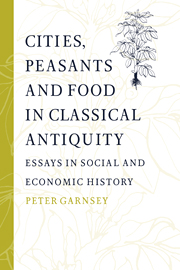Book contents
- Frontmatter
- Contents
- Preface
- Editor's preface
- Acknowledgements
- List of abbreviations
- PART I CITIES
- PART II PEASANTS
- 6 Peasants in ancient Roman society
- 7 Where did Italian peasants live?
- 8 Non-slave labour in the Roman world
- 9 Prolegomenon to a study of the land in the later Roman empire
- 10 Mountain economies in southern Europe
- PART III FOOD
- Bibliography
- Index
6 - Peasants in ancient Roman society
Published online by Cambridge University Press: 02 December 2009
- Frontmatter
- Contents
- Preface
- Editor's preface
- Acknowledgements
- List of abbreviations
- PART I CITIES
- PART II PEASANTS
- 6 Peasants in ancient Roman society
- 7 Where did Italian peasants live?
- 8 Non-slave labour in the Roman world
- 9 Prolegomenon to a study of the land in the later Roman empire
- 10 Mountain economies in southern Europe
- PART III FOOD
- Bibliography
- Index
Summary
I present in this paper a summary view of the condition of the peasantry under the Romans rather than case studies of particular peasant communities. I have two reasons for doing so. Firstly, because regional differences within the Roman empire were so extensive, the most reliable generalizations that can be made about peasants concern the effects on them of the policies and actions of ruling groups, both imperial and local. Secondly, given the largely static technological conditions which prevailed in the Roman world, we can assume that these policies and actions constituted the most significant source of change in social and economic circumstances on the land.
This is not intended as a comparative study. Nevertheless I will make some attempt to apply to the ancient world (for this purpose it seems appropriate to consider Greece as well as Rome) recent theories on the proper classification of societies and economies. Thus we will consider briefly the applicability of current definitions of ‘peasant society’ and ‘peasant economy’ to the Graeco-Roman world.
To judge from the relevant literature, any attempt to apply the label ‘peasant economy’ to the ancient world would be misguided. It is assumed that Rome is to be classed as a slave state. Many Greek states are ruled out of consideration for the same reason. All Greek states fail to meet a requirement of size.
- Type
- Chapter
- Information
- Cities, Peasants and Food in Classical AntiquityEssays in Social and Economic History, pp. 91 - 106Publisher: Cambridge University PressPrint publication year: 1998
- 2
- Cited by



